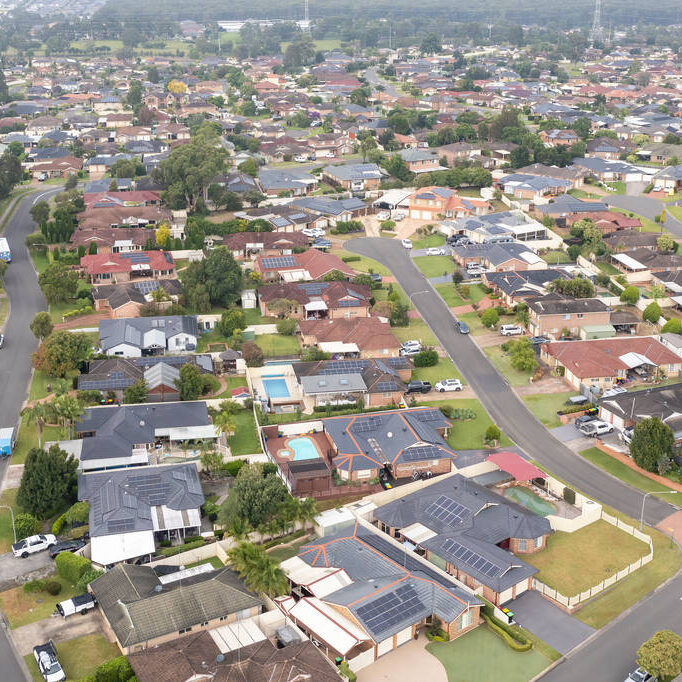You may be chasing more affordable prices, dreaming of a lifestyle change, or spotting investment potential in a different market altogether. No matter the reason, buying property in another state can be pretty tempting. But let’s be clear: buying interstate isn’t quite the same as finding a place down the road. You may have to […]
Fixed vs Variable Rate: Which Should You Get When Refinancing?
Refinancing presents a unique opportunity to reassess your financial situation and secure better terms for your mortgage. But as you take this opportunity, you’ll have to make a choice between a fixed and variable rate for your new home loan. Each option comes with its set of advantages and considerations, and understanding the differences can empower you to make an informed choice that aligns with your financial goals. We explore the fixed vs variable rate showdown and share practical tips to help you make the best financial decision.
Understanding Fixed-Rate Loans
Fixed-rate home loans bring a sense of security and stability to your financial journey. Imagine having the reassurance of a constant interest rate that remains steady over a set period, usually ranging from one to five years. No matter how the market fluctuates, your interest rates and monthly loan repayments will remain unchanged. In turn, you can budget your monthly expenses with confidence and ease.
Pros of Fixed-Rate Home Loans
- Certainty and stability: With fixed rates, you know exactly how much you’ll repay each month. That means peace of mind and help with budgeting.
- Protection against rate hikes: If market rates rise, your fixed-rate mortgage remains unaffected, safeguarding you from potential interest rate increases.
- Long-term planning: Fixed rates are suitable for borrowers who prefer predictable repayments and are planning for the long term. If you believe rates may increase in the future, locking in a fixed rate means you can avoid any rate hikes during the fixed term.
Cons of Fixed-Rate Mortgages
- Limited flexibility: Fixed-rate loans may come with fewer features and less flexibility compared to variable-rate mortgages, potentially limiting your ability to make extra repayments or access redraw facilities.
- Break costs: If you decide to pay off your loan early during the fixed term (including refinancing), break costs may apply, and these costs can be substantial.
- Miss out on interest rate reductions: While a fixed rate keeps your interest rate stable, protecting you from rate rises, if market interest rates are reducing, your fixed rate remains the same, meaning you miss out on any interest expense reductions.
Exploring Variable-Rate Loans
Opting for a variable-rate home loan introduces you to the dynamic world of interest rates, where your journey intertwines with the fluctuations of the official cash rate and market conditions. As a result, your monthly repayments may sway over time, mirroring the current pulse of market interest rates. While variable rates might entice you with lower starting points compared to fixed rates, they have the power to rise or fall during the loan term, influencing your budget and cash flow.
Pros of Variable-Rate Home Loans
- Potential cost savings: Variable rates may start lower than fixed rates, potentially leading to cost savings during periods of low-interest rates. That can be beneficial if you believe rates may decrease in the future.
- Additional features: Variable-rate loans often offer more flexibility and additional features, such as redraw facilities and offset accounts. Such features allow you to optimise your savings and reduce the interest you pay over time.
- Lower exit fees: Variable-rate loans do not come with the break fees that fixed rate loans have, making them more suitable for borrowers who may sell their property in the near future, or those looking to refinance.
Cons of Variable-Rate Loans
- Uncertainty: Variable rates are subject to market fluctuations. This uncertainty can create budgeting challenges, as your monthly repayments may change over time.
- Risk of rate increases: If interest rates rise during the loan term, your repayments will increase. That can impact your overall financial planning.

Fixed vs Variable Loan: Top Considerations for Refinancing
Trying to settle the fixed vs variable rate showdown when refinancing your existing home loan? Consider the following factors:
Your Financial Goals
Assess your financial objectives and how refinancing fits into your overall financial strategy. Determine if stability and predictability (offered by fixed rates) or potential cost savings and flexibility (provided by variable rates) align better with your goals.
Economic Outlook
Stay informed about economic conditions and interest rate forecasts. While no one can predict future rate movements with certainty, understanding economic trends can give you insights into potential interest rate changes during the loan term.
Risk Tolerance
Evaluate your comfort level with interest rate fluctuations and your ability to manage potential rate increases. If you prefer the security of knowing your repayments will remain constant, a fixed rate might be a better fit. If you are fine with some level of uncertainty and think rates may decrease, a variable rate could be more suitable.
More Tips for Making the Right Decision
Still can’t decide about getting a fixed-rate or variable-rate home loan for refinancing? We’ve got more tips to help you nail down your choice.
- Take a Closer Look at Your Financial Situation: Take a closer look at your income, expenses and future financial goals as you navigate this crucial decision between fixed and variable rates. This introspective evaluation will guide you towards the refinancing loan type that perfectly aligns with your overall financial plan. Taking note of your surplus income can help you determine whether you have a large enough buffer to absorb any interest rate increases in the future.
- Consider Your Loan Term: The length of your refinance loan term can influence your rate decision. If you plan to repay your new mortgage over a short period, a fixed rate may offer more certainty during that time. For longer loan terms, a variable rate can provide flexibility in case of rate decreases.
- Hybrid Loan Options: Do you still find it hard to decide between fixed and variable rates? Consider hybrid or split loan options. This approach allows you to allocate a portion of your refinance loan to a fixed rate and the remaining portion to a variable rate, offering a combination of stability and flexibility.
- Review Loan Features: Scrutinise the features offered by fixed and variable-rate loans. Consider whether you need additional features like an offset account or a redraw facility, as these can play a significant role in reducing interest costs over time.
- Consult with a Mortgage Broker: Seek expert guidance from a reputable mortgage broker like Deltos Finance. A mortgage broker can assess your unique financial circumstances, compare loan options and guide you towards the most suitable refinancing solution in line with your needs.
Final Thoughts
Fixed vs variable rate? It’s a choice that can shape your financial future. While fixed rates provide certainty and protection against rate hikes, variable rates offer potential cost savings and added flexibility. By weighing the pros and cons of each option and applying practical tips, you can confidently navigate the refinancing process and secure the best possible terms for your unique circumstances.
Remember that each borrower’s situation is unique, so take your time to assess your options and select the loan type that aligns best with your financial aspirations. If you need expert guidance, don’t hesitate to get in touch with Deltos Finance today.
Enquire Now
Find Your Perfect Finance Solution
Let's discuss your finance needs. We’re here to help.
More posts from Deltos Finance

Suburbs with the Highest Rental Yield in Tasmania
The term “rental yield” is music to any property investor’s ears. It’s the key metric that indicates the annual return on your investment, essentially the percentage of the property’s value that comes back to you in rental income. In a market like Tasmania, which has been gaining traction for its overall investment appeal, pinpointing the […]

Launceston: A ‘Second Wind’ Property Market You Should Invest in Now
When talk turns to Tasmania’s property scene, it’s easy for the spotlight to shine brightly on Hobart, with its bustling waterfront and historic charm. But just a little further north, nestled at the head of the picturesque Tamar Valley, lies Launceston—a city that quietly hits its stride and presents a compelling proposition for savvy property […]

How Often Does Property Double in Value?
Every homeowner has likely dreamed of their property doubling in value in the future, turning into a valuable nest egg or funding their next big adventure. But how long does it actually take for a property to double in value? And how often does it happen? While there’s no magic eight-ball to predict the property […]

Stamp Duty Exemption for First-Home Buyers in Tasmania: Has It Paid Off?
Purchasing a property has historically come with major financial difficulties, especially for first-home buyers in Tasmania or any other state for that matter. The stamp duty is one of those most notable monetary challenges for homebuyers. Essentially, it’s a tax levied on property purchases that often adds tens of thousands of dollars to upfront costs. […]

Difference Between Airbnb and Traditional Renting in Hobart
Hobart’s property market has become a hotspot for investors largely because of its strong tourism demand and stable rental market. But that doesn’t mean all property investments in this Tasmania capital are a sure win. One factor to consider is deciding between short-term rentals like Airbnb and traditional long-term renting. Each option has distinct advantages […]

Is Launceston a Good Place to Live?
The short answer is yes, especially if you want a more affordable lifestyle without giving up access to key services, natural beauty, and long-term opportunities. Also, with its blend of heritage charm, steady economic growth, and a property market still within reach for many Australians, Launceston, Tasmania, is gaining momentum as a popular area for […]

Hobart Property Management Fees: A Complete Guide
You’ve already secured an investment loan and finalised your rental property purchase in Hobart. Now, it’s time to take action by listing the property for rent and managing it effectively to start generating rental income. But how much should you expect to spend on property management in Hobart, Tasmania? As Tasmania’s capital continues to attract […]

How Rising Property Prices Affect Your Home Loan and Buying Potential
Here’s the good news: the Australian real estate market has been experiencing significant growth in recent years, with house prices in major cities reaching record highs. It can be a huge win for homeowners and investors, especially those planning to sell their properties soon. However, this can be an issue for potential property buyers, including […]

Build Your Wealth with a Simple Guide to Using Your Home Equity
Building wealth requires adopting the right mindset and being strategic when using available financial instruments. Essentially, it’s about making your money work in your favour. But what if you don’t have enough cash to start creating wealth? There’s an underutilised strategy that we want to share with you, and that is leveraging your home’s equity—the […]


